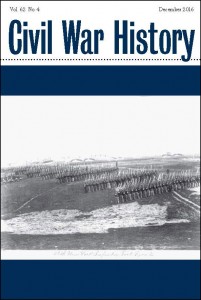December 2016, Volume 62, No. 4
Sep 13th, 2016Places of Exchange: An Analysis of Human and Materiél Flows in Civil War Alexandria, Virginia
by: William G. Thomas, III, Kaci Nash, and Robert Shepard
This article argues that specific geographic, military, and topographical conditions created “funnel points” where the Union Army amassed men, material, and animals to sustain its incursions into the South. Applying the concepts of flows, funnels, and networks from critical geographic and urban studies, this article examines the characteristics of these interstitial zones in the Civil War between the home front and the battlefield. In these places, a series of large-scale processes and movements unfolded over the course of the war, as humans and animals exchanged microbes, landscapes and environmental conditions were altered, properties changed hands, and bureaucratic mechanisms were instantiated. This article examines in detail the character and significances of these disruptions through one of the principal central flow points in the war: Alexandria, Virginia.
Citizens of the County of Their Domicile: Conscription and Confederate Citizenship
by: David Carlson
The Confederate States of America inherited certain antebellum concepts about the nature of citizenship that proved detrimental to its war effort. In particular, the idea that state allegiances outweighed national allegiances produced repeated conflicts with states over the mobilization, arming and command of state troops. The Confederacy’s three conscription laws aimed to rectify many of these problems, but in the process they posed even more questions. Were immigrants required to fulfill a citizen’s obligation to provide military service? What was a Confederate citizen? This article traces Confederate attempts to clarify for the purposes of conscription the nature of Confederate citizenship. It suggests that Confederates altered the relationship between citizenship’s rights and responsibilities and created a new form of quasi-citizenship that brought more people within the scope of the conscription laws.
David Carlson is a lecturer in history at Troy University. He is the coauthor of Plain Folk in a Rich Man’s War and author of several articles on conscription in Confederate Georgia. He is currently creating a Reacting to the Past roleplaying game centered on the Thirteenth Amendment.
Kaci Nash is a Research Associate Fellow at the Center for Digital Research in the Humanities at the University of Nebraska-Lincoln. She serves as project manager and researcher for O Say Can You See: Early Washington, D.C. Law and Family Project and Locating Lord Greystoke: U.S. Empire, Race, and the African Question, 1847-1919.
Robert Shepard Rob Shepard is the GIS Developer at the Digital Scholarship and Publishing Studio, University of Iowa’s digital humanities initiative. He is also a PhD candidate in Geography at University of Nebraska and an associate fellow at the Center for Great Plains Studies. Previously, he worked at Center for Digital Research in the Humanities, where he developed geospatial data and interactive web mapping applications for digital history projects.
William G. Thomas III is the John and Catherine Angle Professor in the Humanities and professor of history at the University of Nebraska- Lincoln. He currently serves as chair of the Department of History and is a Faculty Fellow of the Center for Digital Research in the Humanities. He is a 2016 Fellow of the John Simon Guggenheim Memorial Foundation. Thomas is currently working on a book called A Question of Freedom: The Ordeal of an American Family in the Age of Revolution, chronicling the history of a mixed-race family over four generations in Washington, D.C., Virginia, and Maryland and its hundred-year struggle to become free from slavery
Book Reviews:
DeCaro, Jr., Louis. Freedom’s Down: The Last Days of John Brown in Virginia. Reviewed by Patrick H. Breen.
Strickland, Jeff. Unequal Freedoms: Ethnicity, Race and White Supremacy in Civil War-Era Charleston. Reviewed by David T. Gleeson.
Rothman, Adam. Beyond Freedom’s Reach: A Kidnapping in the Twilight of Slavery. Reviewed by Joyce L. Broussard.
Conlin, Michael F. One Nation Divided by Slavery: Remembering the American Revolution While Marching toward the Civil War. Reviewed by Christopher Childers.
Martinez, Jaime Amanda. Confederate Slave Impressment in the Upper South. Reviewed by Megan Boccardi.
Masur, Louis P. Lincoln’s Last Speech: Wartime Reconstruction and the Crisis of Reunion. Reviewed by Ian Patrick Hunt.
Holzer, Harold and Norton Garfinkle. A Just and Generous Nation: Abraham Lincoln and the Fight for American Opportunity. Reviewed by Matthew E. Stanley.
Downs, Gregory P. and Kate Masur, eds. The World the Civil War Made. Reviewed by Andrew L. Slap.
Uffelman, Minoa D. Ellen Kanervo, Phyllis Smith, and Eleanor Williams, eds. The Diary of Nannie Haskins Williams: A Southern Woman’s Story of Rebellion and Reconstruction, 1863-1890. Reviewed by Matt O’Neal.
Miller, Brian Craig. Empty Sleeves: Amputation in the Civil War South. Reviewed by Emily Mayhew.
Miles, Tiya. Tales from the Haunted South: Dark Tourism and Memories of Slavery from the Civil War Era. Reviewed by Wallace Hettle.
Berlin, Ira. The Long Emancipation: The Demise of Slavery in the United States. Reviewed by Brian Purnell.


